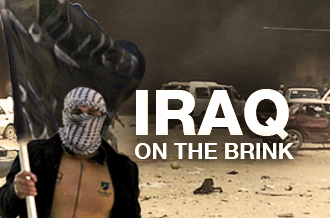The Islamic State: Why mainstream media didn't see it coming
|
|
||

The Islamic State rejects colonially imposed frontiers, writes Cuss [AFP]
|
||
|
By announcing the foundation of a caliphate, Abu Bakr al-Baghdadi, leader of the Islamic State (the group formerly known as the Islamic State of Iraq and the Levant, or ISIL), gave
a clear indication of his group's motives and scale of ambition. More
than just a name change, announcing the Islamic State confirms an intent
to consolidate recent victories while looking beyond the borders of
Iraq and the Levant. It also rejects colonially imposed frontiers as
clearly as the recent symbolic levelling of the Iraqi-Syrian border. The emergence of the caliphate is the inevitable product of the Islamic State's recent successes. To ensure there could be no doubt about their aspirations, they even named this phase of the campaign, "Breaking the Borders". With their customary eye for presentation it harked back to their first phase, "Breaking the Walls", which started in July 2012 when the Islamic State, then still an al-Qaeda affiliate, launched a number of prison breaks to swell its ranks. This included an attack on Baghdad's notorious Abu Ghraib where reportedly more than 500 former convicts were freed. Given that the Islamic State is so transparent about its objectives, and uncompromising about its atrocities, it is perhaps remarkable that recent events caused such a surprise. Regardless, until they stormed into Mosul on June 12, the Islamic State had escaped any serious media or political attention. Lack of media coverage The lack of media coverage is perhaps understandable. A sense of fatigue, following years of violence, has surrounded much of the reporting that comes from Iraq and Syria. Similarly, the dangers inherent in reporting within such an organisation has meant that few commentators have ever really been close to the Islamic State and its operations. This has been a gap the Islamic State has been quick to exploit. Their social media output is a relentless drumbeat of proclamations, while recent advances in technology have given their propaganda videos a professional veneer previous jihadist offerings lacked.
While mainstream journalism may have missed the gathering storm, intelligence services and think tanks have been relentless in warning that this day might come. Yet it was a message without an audience. Western governments confounded by the regional complexities, and representing electorates tired of overseas military ventures, had no wish to face its implications. It was a reticence they may soon regret. National security, like nature, abhors a vacuum, and the West's inaction, both in Iraq and Syria, provided the conditions that allowed the Islamic State to thrive. When, in the run up to a presidential election, the US withdrew their troops from Iraq - despite the praise lavished on the Iraqi security forces - they left swathes of country, particularly on Syria's border, vulnerable to the re-emergence of al-Qaeda. This error was then compounded during the early phases of Syria's civil war when that Western inaction allowed the jihadists to make significant gains at the expense of the moderates. For the US, the emergence of the Islamic State is irrefutable evidence that their Middle East policy to date has failed. It was damned when they chose to intervene in Iraq, and it was damned further when they withdrew. Now with the perverse spectre of the Islamic State mocking their pre-war claims about the need to eliminate violent Islamic extremists, they have little choice but to re-engage. Failure to do so would only allow for wider regional instability while pushing the Iraqi government further into the arms of their regional competitors, Iran and Russia. Iran and Russia Iran's ambitions for Iraq are complex, and while recent dialogue with the US is to be welcomed, it is impossible to imagine that short of stopping the Islamic State, either country has similar aspirations for the region. Similarly, Iran is too close to Iraqi Prime Minister Nouri al-Maliki to escape blame for his handling of the current crisis. Yet their antipathy for the US is nothing compared to that for the Islamic State - and therein lies the grounds for some form of rapprochement. Never shy to take advantage of US discomfort, Moscow has also sought advantage from the crisis. Their recent delivery of five second-hand Sukhoi Su-25 ground attack jets stands in contrast to the delayed US F-16 fighter programme. Similarly, Russia's long-standing support of Syria can only strengthen their credentials as an ally in the fight against the Islamic State. Yet Russia's motives for supporting the fight against the Islamic State extends beyond commercial gain or regional influence. Some of the Islamic State's most ruthless leaders have come from the Commonwealth of Independent States and Russia has bitter experience of battling Islamist militants at home. It is a yet another distant echo of one of the supporting arguments used in 2003. Faced with these conflicting pressures, the US once more has a military presence in Iraq. Yet what is perhaps more significant than the 300 advisers in Baghdad is the recent talk of funding for rebel groups in Syria. Identifying the least-worst candidate as an ally and then backing them with weapons and money is an age-old policy. It takes the US back to the dark arts of the Cold War practised before the heady ideals of liberal interventionism. It's a tactic many wish they had never abandoned. |











0 comments:
Post a Comment